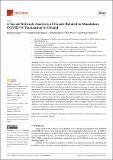| dc.contributor.author | Olszowski, Rafał | |
| dc.contributor.author | Zabdyr-Jamróz, Michał | |
| dc.contributor.author | Baran, Sebastian | |
| dc.contributor.author | Pięta, Piotr | |
| dc.contributor.author | Ahmed, Wasim | |
| dc.date.accessioned | 2022-09-19T18:47:50Z | |
| dc.date.available | 2022-09-19T18:47:50Z | |
| dc.date.issued | 2022-05-10 | |
| dc.identifier.issn | 2076-393X | |
| dc.identifier.uri | https://hdl.handle.net/1721.1/145508 | |
| dc.description.abstract | <jats:p>Poland’s efforts to combat COVID-19 were hindered by endemic vaccination hesitancy and the prevalence of opponents to pandemic restrictions. In this environment, the policy of a COVID-19 vaccination mandate faces strong resistance in the public debate. Exploring the discourse around this resistance could help uncover the motives and develop an understanding of vaccination hesitancy in Poland. This paper aims to conduct a social network analysis and content analysis of Twitter discussions around the intention of the Polish Ministry of Health to introduce mandatory vaccinations for COVID-19. Twitter was chosen as a platform to study because of the critical role it played during the global health crisis. Twitter data were retrieved from 26 July to 9 December 2021 through the API v2 for Academic Research, and analysed using NodeXL and Gephi. When conducting social network analysis, nodes were ranked by their betweenness centrality. Clustering analysis with the Clauset–Newman–Moore algorithm revealed two important groups of users: advocates and opponents of mandatory vaccination. The temporal trends of tweets, the most used hashtags, the sentiment expressed in the most popular tweets, and correlations with epidemiological data were also studied. The results reveal a substantial degree of polarisation, a high intensity of the discussion, and a high degree of involvement of Twitter users. Vaccination mandate advocates were consistently more numerous, but less engaged and less mobilised to “preach” their own stances. Vaccination mandate opponents were vocal and more mobilised to participate: either as original authors or as information diffusers. Our research leads to the conclusion that systematic monitoring of the public debate on vaccines is essential not only in counteracting misinformation, but also in crafting evidence-based as well as emotionally motivating narratives.</jats:p> | en_US |
| dc.publisher | MDPI AG | en_US |
| dc.relation.isversionof | 10.3390/vaccines10050750 | en_US |
| dc.rights | Creative Commons Attribution 4.0 International license | en_US |
| dc.rights.uri | https://creativecommons.org/licenses/by/4.0/ | en_US |
| dc.source | MDPI | en_US |
| dc.title | A Social Network Analysis of Tweets Related to Mandatory COVID-19 Vaccination in Poland | en_US |
| dc.type | Article | en_US |
| dc.identifier.citation | Olszowski, Rafał, Zabdyr-Jamróz, Michał, Baran, Sebastian, Pięta, Piotr and Ahmed, Wasim. 2022. "A Social Network Analysis of Tweets Related to Mandatory COVID-19 Vaccination in Poland." 10 (5). | |
| dc.contributor.department | Massachusetts Institute of Technology. Center for Collective Intelligence | en_US |
| dc.eprint.version | Final published version | en_US |
| dc.type.uri | http://purl.org/eprint/type/JournalArticle | en_US |
| eprint.status | http://purl.org/eprint/status/PeerReviewed | en_US |
| dspace.date.submission | 2022-09-19T18:38:57Z | |
| mit.journal.volume | 10 | en_US |
| mit.journal.issue | 5 | en_US |
| mit.license | PUBLISHER_CC | |
| mit.metadata.status | Authority Work and Publication Information Needed | en_US |
